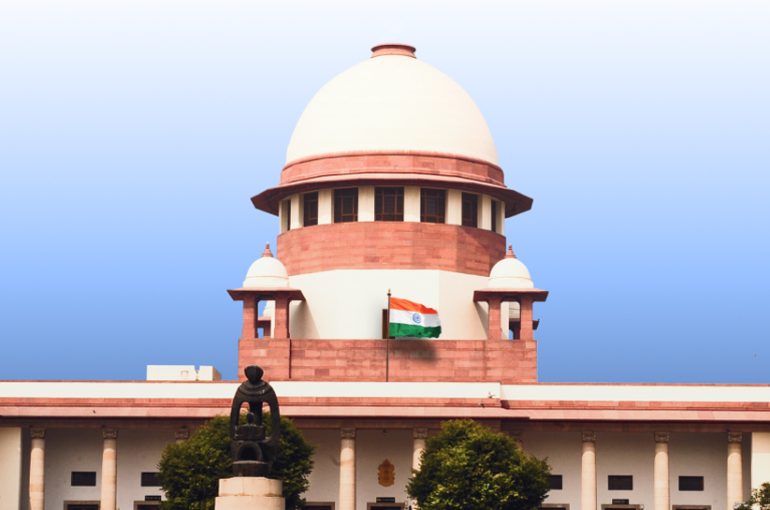CHEQUE DISHONOUR COMPLAINT MAINTAINABLE AGAINST TRUSTEE WITHOUT ARRAYING TRUST AS ACCUSED: SUPREME COURT

Introduction
The Supreme Court of India, in its landmark judgment delivered on October 9, 2025, in Sankar Padam Thapa v. Vijaykumar Dineshchandra Agarwal (SPECIAL LEAVE TO APPEAL (CRIMINAL) NO. 4459/2023), addressed a crucial question regarding the maintainability of complaints under the Negotiable Instruments Act, 1881 (NI Act) against trustees when a trust is not impleaded as an accused. The Two-Judge Bench comprising Justice Ahsanuddin Amanullah and Justice Prashant Kumar Mishra settled the legal position on whether trustees can be prosecuted independently for dishonoured cheques issued on behalf of trusts. The case arose from Criminal Appeal No. 4459/2023, where the Supreme Court examined the legal personality of trusts and the vicarious liability of trustees under Section 141 of the NI Act. This Judgment has significant implications for trust-related financial transactions and criminal prosecutions involving negotiable instruments.
Factual Background
The dispute originated from a complex educational institution takeover arrangement. William Carey University, a recognized private university owned by the Agriculture Crafts Trades and Studies Group of Institutions (ACTS Group), faced severe financial difficulties. To resolve this crisis, ACTS Group entered into a Memorandum of Understanding dated October 12, 2017, with Orion Education Trust (Orion) for transferring the university’s management and administration. Vijaykumar Dineshchandra Agarwal, serving as Chairman of Orion, issued authorization letters empowering Sankar Padam Thapa to liaise with governmental authorities and facilitate the administrative transition. Following the successful transition, Agarwal issued a cheque dated October 13, 2018, bearing number 000013 for Rs. 5 crores, drawn on Kotak Mahindra Bank, Vadodara Branch, in favor of Thapa for services rendered. The cheque was presented at ICICI Bank Branch, Laitumkhrah, Shillong, on December 7, 2018, but was dishonoured with the endorsement “insufficient funds”. Thapa served a legal notice under Section 138 of the NI Act on December 19, 2018, which Agarwal received on December 27, 2018. Despite Agarwal’s response dated December 28, 2018, Thapa filed Complaint Case No. 44(S)/2019 before the Judicial Magistrate, Shillong, alleging offences under Sections 138 and 142 of the NI Act and Section 420 of the Indian Penal Code. Agarwal challenged the Complaint’s maintainability on grounds of non-joinder of necessary parties, specifically arguing that Orion Trust should have been impleaded as the principal accused. The Meghalaya High Court, vide its judgment dated November 21, 2022, allowed Agarwal’s Petition under Section 482 CrPC and quashed the proceedings, prompting Thapa’s Appeal to the Supreme Court.
Contentions of Parties
Thapa’s counsel presented two primary contentions. First, they argued that trusts are ineligible to be sued, relying on Pratibha Pratisthan v. Manager, Canara Bank (2017) 3 SCC 712, which held that trusts are not “persons” under the Consumer Protection Act. They cited several High Court decisions, establishing that trusts cannot sue or be sued independently, as they lack juristic personality. Second, the appellant contended that specific averments regarding the accused’s responsibility in day-to-day trust operations were unnecessary. They relied on SMS Pharmaceuticals Ltd. v. Neeta Bhalla (2005) 8 SCC 89, arguing that Agarwal’s position as Chairman and authorized signatory prima facie established his responsibility for trust operations, similar to a Managing Director’s role in companies.
Respondent’s Senior Counsel adopted a contrary position, asserting that trusts are juristic persons capable of suing and being sued. They relied on which applied the principle of ejusdem generis to include trusts within the expression “company” under Section 141’s explanation of the NI Act. The Respondent argued that the expression “company” encompasses “any body corporate” or “other association of individuals,” thereby including trusts, clubs, and Hindu Undivided Families. They supported their position with various High Court decisions from Bombay, Madras, and Orissa, contending that trusts possess juristic personality for NI Act prosecutions.
Court’s Decision and Analysis
The Supreme Court delivered a comprehensive Judgment favouring the Appellant’s position. The Court examined Sections 3 and 13 of the Indian Trusts Act, 1882, concluding that trusts are “obligations” rather than legal entities. Section 3 defines a trust as “an obligation annexed to the ownership of property,” while Section 13 places the responsibility to “maintain and defend all suits” exclusively on trustees. The Court distinguished between companies and trusts, referencing the landmark Salomon v. A. Salomon and Co. Ltd. (1897) AC 22 case, which established companies as separate legal entities. The Judgment emphasized that trusts operate solely through trustees, who are the actual legal entities responsible for trust operations. Importantly, the Court applied the principles from SMS Pharmaceuticals Ltd. and K.K. Ahuja v. V.K. Vora (2009) 10 SCC 48, establishing that trustees who sign cheques on behalf of trusts are directly responsible under Section 141(2) of the NI Act. The Court noted that signatories of dishonoured cheques bear responsibility for the incriminating act, regardless of specific averments about their day-to-day involvement. The Supreme Court overruled several conflicting High Court decisions, including Prana Educational and Charitable Trust, Mukund s/o Manohar Wazalwar, and Bijaya Manjari Satpathy v. State of Orissa, for incorrectly equating trusts with companies. The Court criticized the Kerala High Court’s approach in the Prana case for ignoring binding precedent from the same Court’s earlier decision in K.P. Shibu.
Conclusion
This Judgment provides crucial clarity on trust liability under the Negotiable Instruments Act. The Court definitively established that complaints under the NI Act are maintainable against trustees who sign cheques on behalf of trusts, without requiring the trust itself to be impleaded as an Accused. This decision has far-reaching implications for trust operations and financial transactions. Trustees must now exercise greater caution when signing cheques, understanding their direct liability under the NI Act. The Judgment also settles the conflicting High Court decisions on trust juristic personality, establishing a uniform legal position across the country. The Court allowed the appeal, quashed the High Court’s judgment, and restored the original criminal proceedings for continuation. This ensures that trustees cannot escape liability merely by arguing that the trust should be the primary accused, thereby strengthening the enforcement mechanism of the Negotiable Instruments Act in trust-related transactions.
YASH HARI DIXIT
Legal Associate
The Indian Lawyer & Allied Services
Please log onto our YouTube channel, The Indian Lawyer Legal Tips, to learn about various aspects of the law. Our latest Video titled “Legal Requirements for Indian Startups | Complete Q&A 2025 | Advocate Sushila Ram Varma” can be viewed at the Link below:





































Leave a Reply